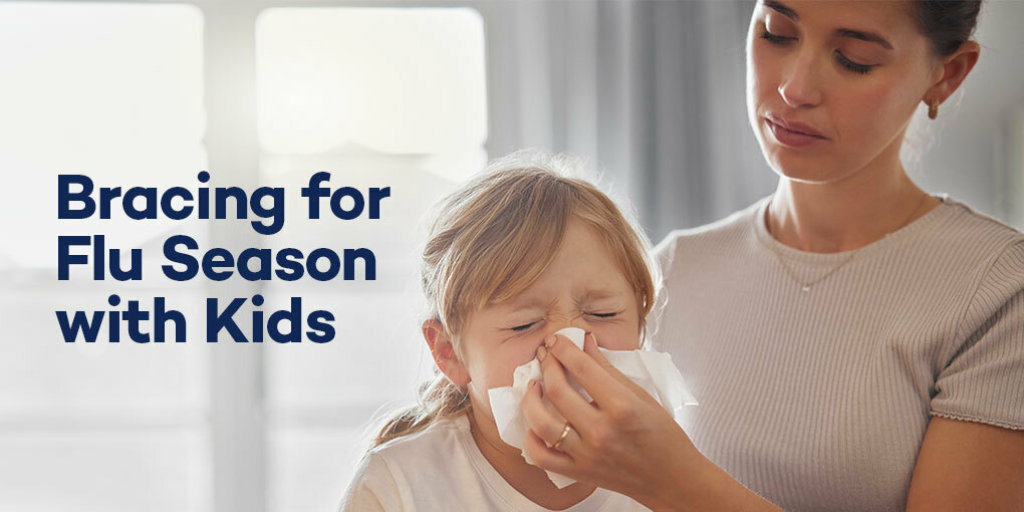Bracing for Flu Season with Kids: 5 Things Parents Should Know

The flu is a highly contagious viral infection of the respiratory tract (nose, throat, and lungs) that is especially dangerous for infants, toddlers, and young children. Flu season starts in the fall and ends in the late spring, putting kids of all ages at risk for several months.
1. Getting a Flu Vaccine Is Your Best Defense (Kids Included)
The Centers for Disease Control and Prevention (CDC) recommends an annual flu vaccine for everyone six months and older. Because flu viruses are constantly changing, the vaccine is updated each year to include the most common strains. The 2023-24 flu vaccine protects against four different types of flu virus.
The flu vaccine is especially important for:
- Children under five years old
- Children with chronic health conditions
- Women who are pregnant, recently delivered, or breastfeeding (to help protect infants who are too young to get vaccinated)
If you haven’t already, ask about getting the flu vaccine for your child, yourself, and any other family members. It’s not too late!
2. Watch for These Flu Danger Signs, Especially in Young Children
Unlike children with a cold (who usually have a low-grade fever, runny nose, and slight coughing), children with the flu will likely feel a lot sicker and achier. Common flu symptoms include a sudden fever of 100.4°F or more, persistent cough, body aches, chills, sore throat, stuffy or runny nose, fatigue, and more.
If your child develops any of the following symptoms, contact your pediatrician or seek immediate care:
- Difficulty breathing or unusually rapid breathing
- Ribs seem to pull in with each breath
- Muscle pain so severe that your child refuses to walk
- Skin or lips turn blue
- Lack of tears when crying
- Not urinating for eight hours or more
- Fever above 104°F (or any fever if less than three months old)
- Seizures
Of course, it can be harder to pinpoint symptoms when your child is too young to talk or fully communicate. Extreme irritability, not eating or drinking, and fewer wet diapers are additional signs that your infant or toddler may have the flu and need medical care.
3. Kids with Chronic Health Conditions Are at Greater Risk
Any child can develop severe, life-threatening flu symptoms. But the children at greater risk for developing complications from the flu are those with an underlying chronic health condition that compromises their immune system, such as cancer or diabetes.
It’s important for these children to get a flu vaccine every year and avoid people with flu symptoms (including other children) whenever possible. Ask your pediatrician if there are other precautions you should take, and seek immediate care if your child has flu-like symptoms.
4. When to Visit an Urgent Care Clinic vs. the Emergency Room
Flu symptoms can often be treated quickly and effectively at urgent care clinics, freeing emergency rooms to focus on patients in greater need of critical care.
The flu usually isn’t an emergency for older children and adults who are otherwise healthy. In fact, visiting an emergency room when your child doesn’t have the flu can expose them to others who do have the virus – increasing their chances of getting infected.
However, certain high-risk groups (including infants and toddlers) are far more vulnerable to the dangers of the flu. You should seek emergency care if your child exhibits any of the flu danger signs listed above, or if your infant or toddler has potential flu symptoms.
5. Tips for Treating Your Child’s Flu
Since antibiotics only work against bacteria and not viruses, the flu usually doesn’t require prescribed medical treatment. Here are some ways to help your child feel better as they recover:
- Offer plenty of liquids to avoid dehydration
- Give acetaminophen (Tylenol) or ibuprofen (Advil) for fever and aches
- If your child is 12 months or older, a few teaspoons of honey at night can help loosen their cough
- If your child is six years or older, over-the-counter cough or cold medicine can also provide relief
- Dress your child in layers that are easy to add and remove during bouts of chills or fever
- Encourage them to rest in bed or on the couch, perhaps with a supply of their favorite books or movies
- Use a cool-mist humidifier that you clean at least once a day
Is a stuffy nose making your child miserable? For infants, put a few drops of saline into their nose and gently suction out the mucus with a bulb syringe. Only do this 2-3 times a day, so your baby’s nose won’t get sore. Older kids can use saline nose spray up to three times a day.
TrustCare Kids Is Your Flu Expert
At TrustCare Kids, our goal is to help your child Feel Better Faster® this flu season and beyond.
TrustCare Kids offers pediatric primary care and urgent care from birth through college. Because kids often get sick beyond regular business hours, our highly trained team is available for weeknight and weekend care. Services include:
- Sick and well-child visits
- Vaccinations
- Flu, RSV, and COVID-19 testing
- School, sports, and camp physicals
- X-rays
- And more
You don’t have to fight the flu alone! Schedule an appointment with TrustCare Kids today.
